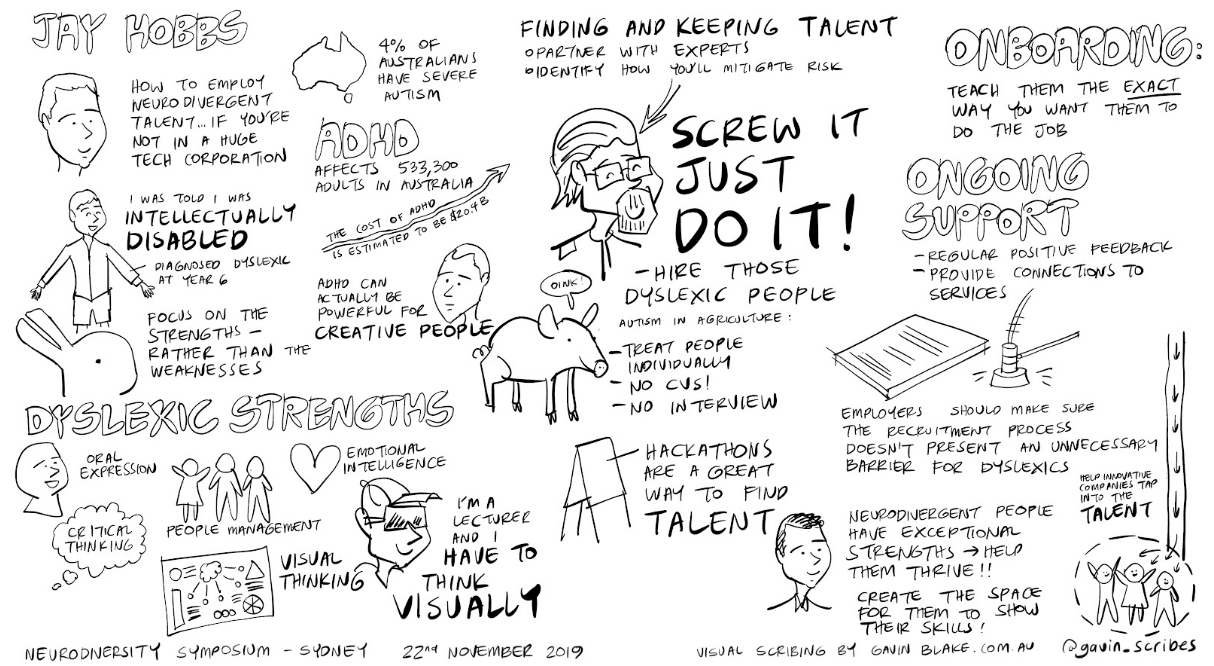How to Employ Neurodivergent Talent if You're A Small Business [Guide]
![How to Employ Neurodivergent Talent if You're A Small Business [Guide]](https://static1.s123-cdn-static-a.com/uploads/5695988/2000_618cb9e838b0b.png)
Alison Eveleigh | 05/12/2019
Here are some simple steps that small businesses can take to find and keep neurodivergent talent.
Sydney Neurodiversity Symposium 2019 Presentation Summary: Jay Hobbs
As part of Thriving Now's Sydney Neurodiversity Symposium 2019, held at Fishburners Sydney, Thriving Now director Jay Hobbs speaks about how someone can employ neurodiverse talent when they are small business.
Takeaway: While small business may lack the resources of their bigger corporate cousins, that doesn’t mean that can’t initiate a neurodiverse recruitment program. There are some simple steps that small business can take to find and keep neurodiverse talent.
Background
- Jay Hobbs is a psychologist who assists small companies with neurodivergent recruitment. Jay was diagnosed with dyslexia in year 6, and with ADHD at age 44. He fell behind at school, but his parents recognised that he was struggling. He credits their support for his success today and believes in the social model of disability: that your environment can enable you or disable you.
- Dyslexia in Australia: 10% of Australians are dyslexic, and 4% are severely dyslexic. That’s 2,460,000 Australians. However, the EY report ‘The value of dyslexia’ notes that dyslexic people have many talents, such as:
- An exceptional ability to connect
- Exceptional reasoning skills
- Good visualisation and imagination skills
- Good communication skills
- ADHD in Australia (AAAPA) statistics according to the Deloitte Report:
- ADHD affects approximately 281,200 children and adolescents (aged 0-19) and 533,300 adults (aged 20+) in Australia.
- The total cost of ADHD in Australia was estimated to be $12.8 billion in financial costs and $7.6 billion in wellbeing costs.
- Productivity costs resulting from reduced workforce participation, absence from work and reduced productivity while at work make up 81% of total financial costs.
How to implement a Neurodiverse Hiring Program for Small Business
Jay believes that those with ADHD are more creative and can often be trail blazers in their field. However, they also come with challenges, such as getting distracted easily. If not supported correctly, it is difficult to unlock the benefits of having such employees.
- When Neurodiverse employees are supported, employers are left with their strengths, which are a valuable asset for small businesses. Jay wants to help innovative organisations access Neurodiverse talent and create workplaces and recruitment processes that allow Neurodivergent people to demonstrate their skills.
- Jay believes there are 4 simple steps for small business to implement a Neurodiversity recruitment program (as illustrated by the Autism and Agriculture program that was implemented through Specialisterne Australia):
- Planning and Communication:
- Identify the skills and talent you need in two areas and be flexible with qualifications and experience
- Work with experts to develop a plan to find neurodivergent talent with those skills. Look at different candidate identification processes.
- Share the project aims, goals and timelines with everyone
- Recruitment Process:
- Remove the CV and interview process
- Allow candidates to complete an online survey or otherwise demonstrate their experience and skills (with pictures, video or words)
- Allow candidates to complete a trail (e.g. in the virtual piggery, wearing the outfit, experience the sensory environment)
- Onboarding and training:
- Implement a mentoring program
- Provide regular feedback
- Ensure you teach skills the correct way
- Ongoing Support for Employee
- Make clear the supports available at the workplace
- Provide regular, one-on-one feedback once a week, reducing over time
- Provide connection with personal support as needed (e.g psychologist)
- Ongoing Support for staff
- Check in with manager weekly, reducing over time
- Provide additional training on the effective management of the individual(s) prior to start date
- Provide ad-hoc support as needed
- Planning and Communication:
Conclusion
Employing neurodivergent people directly is not the only way for businesses to benefit from their unique talents and abilities. auticon directly employs autistic IT consultants where they are then farmed out to companies on contracts.
Check out the sketchnote below for a visual summary of Jay's talk.
